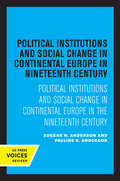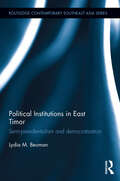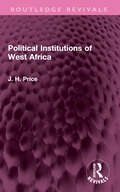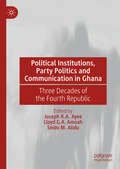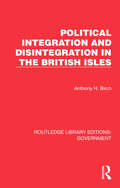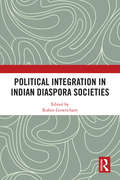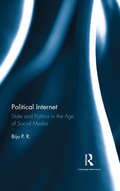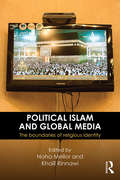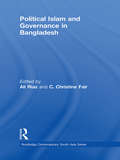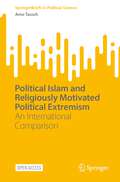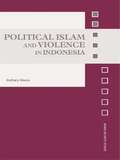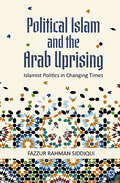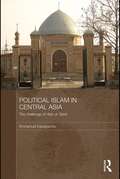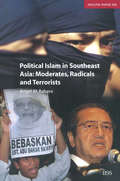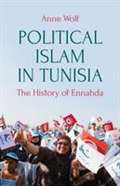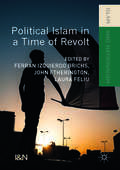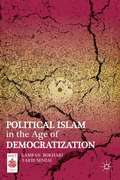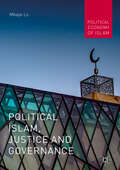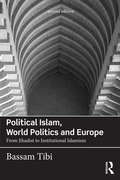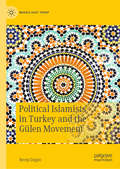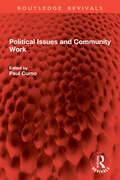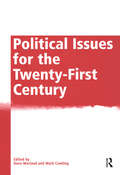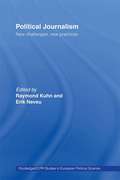- Table View
- List View
Political Institutions and Social Change in Continental Europe in the Nineteenth Century
by Pauline R. AndersonThis title is part of UC Press's Voices Revived program, which commemorates University of California Press’s mission to seek out and cultivate the brightest minds and give them voice, reach, and impact. Drawing on a backlist dating to 1893, Voices Revived makes high-quality, peer-reviewed scholarship accessible once again using print-on-demand technology. This title was originally published in 1967.
Political Institutions in East Timor: Semi-Presidentialism and Democratisation (Routledge Contemporary Southeast Asia Series)
by Lydia M. BeumanIn 2002, East Timor became an independent state following a long conflict with Indonesia, and went on to adopt a semi-presidential form of government. In a semi-presidential system there is a directly elected fixed-term president, prime minister and government who are collectively responsible for the legislature. Over 50 countries in the world have adopted such a system. This book examines the politics of semi-presidentialism in East Timor from 2002-2012 and post-2012 political developments. It analyses the impact of semi-presidentialism on the performance of East Timor’s democracy, and looks at whether semi‐presidentialism encourages power sharing between competing forces, or whether it provoke a power struggle that threatens democratic stability. Using East Timor as a case study, the author explains whether the adoption of semi-presidentialism helps or hinders the process of democratisation in new democracies. It is of interest to researchers in the fields of Political Science, Conflict Resolution and Asian Studies, in particular Southeast Asian Politics.
Political Institutions of West Africa (Routledge Revivals)
by J. H. PriceThis book, originally published in 1967 looks at political institutions in Nigeria, Ghana, Sierra Leone, Liberia and Gambia a the time of the establishment of alien rule and goes on to discuss in detail constitutional developments from 1919 to the late 20th Century, paying particular attention to the constitutional arrangements of the Commonwealth West African countries after Independence. Aspects such as the judiciary and the enforcement of law and order, the public services and finance, are discussed in separate chapters. The book ends with a survey of the varying patterns of local government in English-speaking West Africa.
Political Institutions, Party Politics and Communication in Ghana: Three Decades of the Fourth Republic
by Joseph R. A. Ayee Lloyd G. A. Amoah Seidu M. AliduThis book is one of two volumes that examines the successes and failures of the Ghanaian Fourth Republic from a political, public administration and public policy viewpoint. Published to coincide with the thirtieth anniversary of the founding of the Fourth Republic, these volumes bring together leading scholars to consider the political achievements and failures that have taken place in the country since the early 1990s, and what these tell us about the state of politics and democracy in twenty-first century Ghana and beyond. This volume focuses on party politics, political communication and public policy. It assesses themes such as interest groups, electoral politics, democratization, constitutionalism, the role of the media, and gender and politics. The volume also places Ghana in a global context, demonstrating how lessons learnt from the country can be applied elsewhere around the world, and what is unique about the Ghanaian political experience. It will appeal to all those interested in public policy, public administration and African politics.
Political Integration and Disintegration in the British Isles (Routledge Library Editions: Government)
by Anthony H. BirchOriginally published in 1977, this book provided the first analysis of the processes of political integration and devolution within the British Isles, taking account of the social, economic and cultural factors involved as well as the unique character of the political system, together with the growth of Scottish and Welsh nationalism. The book contains both an analysis of the nationalist movements of Ireland, Ulster, Scotland and Wales and a critical assessment of the way British central Governments have reacted to these movements.
Political Integration in Indian Diaspora Societies
by Ruben GowricharnThis book studies the political integration of Indian diaspora communities into their host societies. It argues that insertion occurs on an ethnic basis which enables these groups to utilise their clout, and at the same time exert collective rights in matters like freedom of religion, organisation and lifestyle. Drawing on case studies from South Africa, America, and the Caribbean, the volume analyses different forms, levels and patterns of groupist political integration. It examines various instances of integration such as anti-Indian apartheid laws; the life and times of Dr Sudhindra Bose, one of the early Bengali intellectuals in the US; Hindutva organisations in the US/UK; as well as the introduction of the Overseas Citizen of India (OCI) Scheme by the Indian government. An important intervention in the study of ethnic groups and their integration, the book will be of interest to students and researchers of diaspora studies, globalization and transnational migration, cultural studies, minority studies, sociology, political studies, international relations, and South Asian studies.
Political Internet: State and Politics in the Age of Social Media
by Biju P. R.This book investigates the Internet as a site of political contestation in the Indian context. It widens the scope of the public sphere to social media, and explores its role in shaping the resistance and protest movements on the ground. The volume also explores the role of the Internet, a global technology, in framing debates on the idea of the nation state, especially India, as well as diplomacy and international relations. It also discusses the possibility of whether Internet can be used as a tool for social justice and change, particularly by the underprivileged, to go beyond caste, class, gender and other oppressive social structures. A tract for our times, this book will interest scholars and researchers of politics, media studies, popular culture, sociology, international relations as well as the general reader.
Political Islam and Global Media: The boundaries of religious identity
by Noha Mellor Khalil RinnawiThe development of new and social networking sites, as well as the growth of transnational Arab television, has triggered a debate about the rise in transnational political and religious identification, as individuals and groups negotiate this new triad of media, religion and culture. This book examines the implications of new media on the rise of political Islam and on Islamic religious identity in the Arab Middle East and North Africa, as well as among Muslim Arab Diasporas. Undoubtedly, the process of globalization, especially in the field of media and ICTs, challenges the cultural and religious systems, particularly in terms of identity formation. Across the world, Arab Muslims have embraced new media not only as a source of information but also as a source of guidance and fatwas, thereby transforming Muslim practices and rituals. This volume brings together chapters from a range of specialists working in the field, presenting a variety of case studies on new media, identity formation and political Islam in Muslim communities both within and beyond the MENA region. Offering new insight into the influence of media exposure on national, political, and cultural boundaries of the Islamic identity, this book is a valuable resource for students and scholars of Middle Eastern politics, specifically political Islam and political communication.
Political Islam and Governance in Bangladesh (Routledge Contemporary South Asia Series)
by Ali RiazThe past decade has seen a marked policy focus upon Bangladesh, home to nearly 150 million Muslims; it has attracted the attention of the world due to weak governance and the rising tide of Islamist violence. This book provides a broad-ranging analysis of the growth and impact of "political Islam" in Bangladesh, and reactions to it. Grounded in empirical data, experts on Bangladesh examine the changing character of Bangladeshi politics since 1971, with a particular focus on the convergence of governance, Islamism and militancy. They examine the impacts of Islamist politics on education, popular culture and civil society, and the regional and extraregional connections of the Bangladeshi Islamist groups. Bringing together journalists and academics - all of whom have different professional and methodological backgrounds and field experiences which impact upon these issues from different vantage points - the book assesses Bangladesh’s own prospects for internal stability as well as its wider impact upon South Asian security. It argues that the political environment of Bangladesh, the appeal of Islamist ideology to the general masses and the dynamic adaptability of Islamist organizations all demonstrate that Bangladesh will continue to focus the attention of policy makers and analysts alike. This is a timely, incisive and original explanation of the rise of political Islam and Islamic militancy in Bangladesh.
Political Islam and Religiously Motivated Political Extremism: An International Comparison (SpringerBriefs in Political Science)
by Arno TauschThis open access book presents an international comparison of religiously motivated extremism in the Arab world and around the globe. Based on data from the Arab Barometer and the World Values Survey, it applies advanced statistical techniques to analyze how religiously motivated political extremism affects political and social outcomes as well as political violence. The study clearly shows that identification with a political Islam that also influences elections, promotes religious and gender discrimination, and advocates an Islamist interpretation of Islam, are the main interrelated syndromes of political Islam that together explain more than 50% of the total variance of the 24 model variables used.“A carefully and methodically flawlessly researched work, which is highly recommended for all those who deal seriously with this topic. Professor Arno Tausch is clear-headed and possesses a remarkable ability to make the broad picture of Political Islam accessible.“Hon. Prof. Gunther Hauser, Head of the Department Strategy and Security Policy, National Defense Academy, Vienna, Austria“Methodological rigorous, scientifically sound, empirically rich and combining the best of qualitative and quantitative approaches, Prof Arno Tausch has produced a tour de force on Political Islam. This study reflects the best scholarship on the subject and will be of use to both policy makers and academics.”Prof Hussein Solomon, Academic Head of the Department of Political Studies and Governance, University of the Free State, South Africa
Political Islam and Violence in Indonesia (Asian Security Studies)
by Zachary AbuzaPolitical Islam and Violence in Indonesia presents a penetrating new investigation of religious radicalism in the largest Muslim country in the world. Indonesia is a country long known for its diversity and tolerant brand of Islam. However, since the fall of Suharto, a more intolerant form of Islam has been growing, one whose adherents have carried out terrorist attacks, waged sectarian war, and voiced strident anti-Western rhetoric. Zachary Abuza’s unique analysis of radical Islam draws upon primary documents such as Jemaah Islamiyah’s operations manual, interviews, and recorded testimonies of politicians, religious figures, and known militants, as well as personal interviews with numerous security and intelligence experts in Indonesia and elsewhere, to paint a picture at once guardedly optimistic about the future of Indonesian democracy and concerned about the increasing role of conservative and radical Islam in Indonesian society. This book will be of great interest to students of Indonesian politics, Asian studies, political violence and security studies in general.
Political Islam and the Arab Uprising: Islamist Politics in Changing Times
by Fazzur Rahman SiddiquiTraces the changing trajectory of Arab politics through the Arab uprising Delving into the history of political Islam in the colonial period, this book shows how the idea of modernity, intense interaction, contestation and engagement between Islamist forces and the emerging democratic voices in the region have contributed to the recent Arab uprising. While investigating the role of religion in shaping the unfolding political situation in the Arab world it also discusses the future of political Islam. This is an ethnographic study encompassing the contestation between political Islam and the secular polity of the past and present, as well as the reconciliation between post-Arab spring politics and new Islamist forces in the region.
Political Islam in Central Asia: The challenge of Hizb ut-Tahrir (Central Asian Studies #Vol. 21)
by Emmanuel KaragiannisThe terrorist attacks in the United States on 9/11 and the U.S.-led military campaign against the Taliban regime in Afghanistan have intensified scrutiny of radical Islamic groups across Central Asia. This books offers one of the first comprehensive studies of the activities of one of the most feared - but least understood - inernational Islamist organizations in post-Soviet Central Asia: Hizb ut-Tahrir, that is The Party of Islamic Liberation. By utilizing social movement theory, the book analyses political Islam in Central Asia in general, and the phenomenon of Hizb ut-Tahrir in particular. It reveals the critical role of its ideology (based on a selective interpretation of Islamic theology and history) in the party’s recruiting success. Using primary sources, including the group’s publications and documents, official reports, alongside interviews with scholars, security experts, mullahs, journalists, diplomats, government officials and group members, it covers the rise of political Islam in the post-Soviet Central Asia, alongside the origins and current status of Hizb ut-Tahrir - its leadership, ideology, political methodology and party structure and its rise in the region from Kazakhstan to Russia and China. Although the organization has received less international examination partly because it has advocated a non-violent approach toward its goals, this book sketches its prospective future relationship to violence in this key region.
Political Islam in Southeast Asia: Moderates, Radical and Terrorists (Adelphi series #No.358)
by Angel RabasaProvides an overview of the evolution of political Islam in South-east Asia. Analyses the sources of relgious radicalism and assesses the regional terrorist and radical networks. Describes how secular democratic institutions can be strengthened, and how moderate and tolerant tendencies can be promoted.
Political Islam in Tunisia: The History of Ennahda
by Anne WolfPolitical Islam in Tunisia uncovers the secret history of Tunisia's main Islamist movement, Ennahda, from its origins in the 1960s to the present. Banned until the popular uprisings of 2010-11 and the overthrow of Ben Ali's dictatorship, Ennahda has until now been impossible to investigate. This is the first in-depth account of the movement, one of Tunisia's most influential political actors.Based on more than four years of field research, over 400 interviews, and access to private archives, Anne Wolf masterfully unveils the evolution of Ennahda's ideological and strategic orientations within changing political contexts and, at times, conflicting ambitions amongst its leading cadres. She also explores the challenges to Ennahda's quest for power from both secularists and Salafis. As the first full history of Ennahda, this book is a major contribution to the literature on Tunisia, Islamist movements, and political Islam in the Arab world. It will be indispensable reading for anyone seeking to understand the forces driving a key player in the country most hopeful of pursuing a democratic trajectory in the wake of the Arab Spring.
Political Islam in a Time of Revolt
by Ferran Izquierdo Brichs John Etherington Laura FeliuThis book explores the increasing political and social prominence of Islamist groups across the Middle East in recent years. The aftermath of the 2011 uprisings saw some groups access or even control political institutions through success at the ballot box, while there has also been a marked resurgence of armed Islamist groups that have had profound effects at both the national and regional level. This volume helps us to understand the nature and development of organised political Islam over recent decades in several key Arab and Mediterranean countries: Mauritania, Morocco, Algeria, Tunisia, Libya, Egypt, Syria, Lebanon, the Palestinian Territories, and Turkey. The book identifies the central social and political Islamist actors, traces their ideological differences and similarities, and analyses power relations both within and between these organizations in the context of political instability and uncertainty. It will be of interest to students and scholars across a broad range of disciplines including political science, sociology, and international relations.
Political Islam in the Age of Democratization
by Kamran Bokhari Farid SenzaiThe continued prominence of Islam in the struggle for democracy in the Muslim world has confounded Western democracy theorists who largely consider secularism a prerequisite for democratic transitions. Kamran Bokhari and Farid Senzai offer a comprehensive view of the complex nature of contemporary political Islam and its relationship to democracy.
Political Islam, Iran, and the Enlightenment
by Ali MirsepassiAli Mirsepassi's book presents a powerful challenge to the dominant media and scholarly construction of radical Islamist politics, and their anti-Western ideology, as a purely Islamic phenomenon derived from insular, traditional, and monolithic religious "foundations. " It argues that the discourse of political Islam has strong connections to important and disturbing currents in Western philosophy and modern Western intellectual trends. The work demonstrates this by establishing links between important contemporary Iranian intellectuals and the central influence of Martin Heidegger's philosophy. We are also introduced to new democratic narratives of modernity linked to diverse intellectual trends in the West and in non-Western societies, notably in India, where the ideas of John Dewey have influenced important democratic social movements. As the first book to make such connections, it promises to be an important contribution to the field and will do much to overturn some long-held and pervasive assumptions about the dichotomy between East and West.
Political Islam, Justice and Governance (Political Economy of Islam)
by Mbaye LoThis book argues that political Islam (represented by its moderate and militant forms) has failed to govern effectively or successfully due to its inability to reconcile its discursive understanding of Islam, centered on literal justice, with the dominant neo-liberal value of freedom. Consequently, Islamists' polities have largely been abject, often tragic failures in providing a viable collective life and sound governance. This argument is developed theoretically and supported through a set of case studies represented by the Muslim Brotherhood in Egypt (under President Muhammad Morsi’s tenure), Hassan Turabi's National Islamic Front in Sudan and The Islamic State in Iraq and Syria (ISIS). It is ideal for audiences interested in Regional Politics, Islamic Studies and Middle Eastern Studies.
Political Islam, World Politics and Europe: From Jihadist to Institutional Islamism
by Bassam TibiThe new and updated edition of Political Islam, World Politics and Europe focusses on the shift within political Islam, in light of 9/11 and the events of the Arab Spring, from a jihadist struggle, to institutional Islamism. Refuting what has often been referred to by commentators as the ‘moderation,’ of Islamism, the second edition of this book introduces the concept of ‘institutional,’ Islamism, a process which Tibi argues was accelerated in the aftermath of the Arab Spring. Both jihadist and institutional Islamism pursue the same goal of an Islamist state, but disagree fundamentally on the strategy for achieving it. Whilst jihadism is committed to the idea of a (violent) Islamic world revolution, institutional Islamism embraces political institutions as a means to an end. Turning to the events of the Arab Spring in Tunisia, Libya and Egypt this book attempts to determine whether an abandonment of violence is enough to underpin a shift to genuine democracy. Analysing the fall of Morsi in particular, Tibi questions what lessons can be learnt from his presidency, and argues that this event will not change the overall trend of development from jihadism to institutional Islamism A timely addition to existing literature, this book will be of interest to students and scholars studying Middle Eastern and European Politics, Political Islam and International Relations.
Political Islamists in Turkey and the Gülen Movement (Middle East Today)
by Recep DoganThis book explores the struggle and differences between the current governmental power, the AKP, and the Gülen movement, the leading civic Islamic movement, in Turkey. It discusses the history of relations between the AKP and the Gülen movement and analyzes the reasons that caused tensions and, eventually, a radical rupture between them. In order to help readers to better understand the difference between Political Islam and civil Islam, the project explains the political theology of each group and compares them to each other. The author explains the human rights violations, restrictions on the media and the destruction of democratic institutions in Erdogan’s New Turkey project. This is an ideal monograph for scholars interested in the Middle East, sociology, and political Islam.
Political Issues and Community Work (Routledge Revivals)
by Paul CurnoOriginally published in 1978 this book was compiled with practitioners in mind. It clarifies the implications of significant political theories and issues of the 20th Century which affected their work. Drawing on case studies from their own experience, the contributors underline the political variables facing the community worker, whatever the context. Examples are from the local neighbourhood, from inside and outside the local authority, and – dramatically illustrating the ideological, practical and political dilemmas faced in some form by most community groups – from a picture of community action in Northern Ireland. The final section considers two growing strands in community work – the importance attached to developing knowledge and technical competence, and the increasing emphasis being given to making alliances with other relevant groups and organisations.
Political Issues for the Twenty-First Century
by Mark CowlingAssembling accessible and informative essays on contemporary debates and future issues in politics, this rewarding volume focuses on political developments in UK, European and international issues, and modern theoretical debates and problems. Each essay establishes the historical context before providing a speculative analysis of possible future developments. The collection presents a range of challenging and provocative accounts that deal with some of the most delicate, complex and fundamental issues that affect people living in Western Europe in the twenty-first century.
Political Journalism in Comparative Perspective
by Erik Albæk Arjen van Dalen Nael Jebril Claes H. de Vreese Erik Albæk Arjen Van Dalen Nael Jebril Claes H. de VreesePolitical journalism is often under fire. Conventional wisdom and much scholarly research suggest that journalists are cynics and political pundits. Political news is void of substance and overly focused on strategy and persons. Citizens do not learn from the news, are politically cynical, and are dissatisfied with the media. This book challenges these assumptions, which are often based on single-country studies with limited empirical observations about the relation between news production, content, and journalism's effects. Based on interviews with journalists, a systematic content analysis of political news, and panel survey data in different countries, this book tests how different systems and media-politics relations condition the contents of political news. It shows how different content creates different effects, and demonstrates that under the right circumstances citizens learn from political news, do not become cynical, and are satisfied with political journalism.
Political Journalism: New Challenges, New Practices (Routledge/ECPR Studies in European Political Science #Vol. 26)
by Raymond Kuhn Erik NeveuPolitical Journalism explores practices of political journalism, ranging from American 'civic journalism' to the press corps covering the European Union in Brussels, from Bangkok newsrooms to French and Italian scandal hunters. Challenging both the 'mediamalaise' thesis and the notion of the journalist as the faithful servant of democracy, it explores political journalism in the making and maps the opportunities and threats encountered by political journalism in the contemporary sphere.
